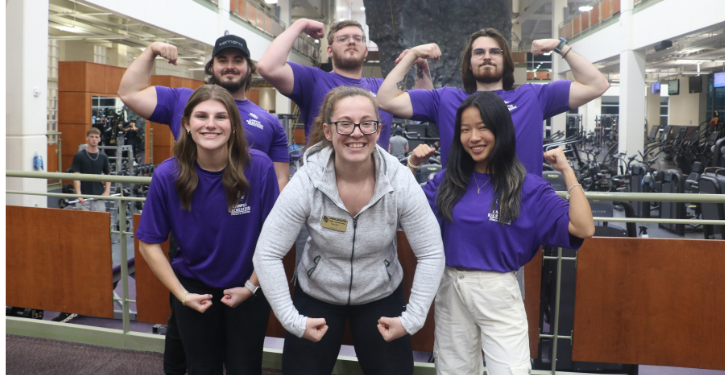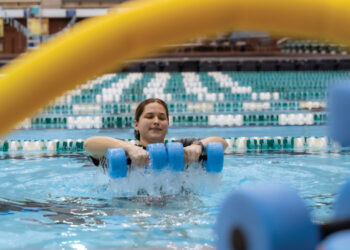The innovative Fitness Buddies program helps students overcome isolation, build community and explore fitness together.
Campus recreation in a post COVID-19 pandemic world has had to shift to accommodate students dealing with the social isolation side effects. One unique way that Stephen F. Austin (SFA) State Campus Recreation combats social isolation is through the Fitness Buddies program.
The Fitness Buddies Mission
By pairing students with fitness-oriented peers, Fitness Buddies fosters community in a non-intimidating environment. The program provides the encouragement needed to explore the campus recreation center and engage with its offerings, making fitness accessible and enjoyable for all.
“The focus of it is to bring students together to promote belonging through just socializing and physical activity,” said Jescelyn Madrigal, the assistant director of Fitness and Wellness. “Our goal is to combat that isolation from the COVID-19 pandemic by bringing students together to be physically active and connect.”
As such, Fitness Buddies is not limited to fitness newcomers. Rather, the program is designed to facilitate building connections for students of all skill levels. Students might be confident in their fitness journey but unable to connect with the rec department. The program is designed to make fitness less intimidating while simultaneously opening a link to the rec center for all students.
“The focus is providing a connection within the rec department,” said Mackenzie Suggs, the fitness manager for SFA Fitness and Wellness. “Regardless of skill level, students want to find a sense of belonging that provides guidance and encouragement.”
Encouraging Exploration
By allowing students to explore what the university has to offer, Fitness Buddies benefits the rec department because it acts as a funnel towards other free and paid programs — group fitness, personal training and massage therapy.
“We teach the student volunteers to have all the tools to provide individualized guidance,” said Madrigal. “This leads students to check out our paid programs like personal training or massage training.”
Rather than being limited to the four walls of the gym, Fitness Buddies offers an avenue to explore their community. Participants and their buddies can explore various activities, including group fitness classes, outdoor walks, rock climbing and swimming. Adapting to individual preferences creates a customizable experience that encourages students to create their own fitness journey.
Volunteer-Centric Programming
The benefits from this program also extends to the volunteers. Most students who interview for Fitness Buddies are looking to go into personal fitness or training careers. This program helps teach these students the skills necessary for these fields.
“Fitness Buddies helps our volunteers build rapport between peers, connect with students individually and gain leadership abilities before they get into their careers,” said Suggs.
After staff training, Suggs matches volunteers with students and their first meeting is a trial run to see if they are compatible. If the students work well together, they collectively decide how to move forward to create a personalized and supportive experience. The volunteers make each partnership a unique experience for both parties.
Guiding Instead of Teaching
However, one key challenge the program faces is that student volunteers are not licensed to provide personal training-level guidance. As such, volunteers can’t provide explicit instructions, but they are able to provide encouragement.
“We try to teach students a motivational interviewing technique,” explained Suggs. “An example would be a volunteer telling the participant they’re going to do 10 reps. If the student participant wants to do 10 reps, they can as well. If they want to do more or less, it’s their choice, but the volunteer will be there to support them.”
Being aware of what restrictions your university has in place is key to ensuring the program is a success. Training both volunteers and staff on the scope of the program is crucial in a successful implementation in the rec department.
A Broader Impact
For universities considering similar programs, Madrigal and Suggs emphasized the importance of collaboration. The program was adopted from the University of Colorado Colorado Springs, where it began as a research-based initiative led by Jessica Kirby, an assistant professor of Health Sciences. With her guidance and resources, SFA State Campus Recreation team adapted the concept. Sharing resources and experiences opens the opportunity for rec departments to create tailored initiatives that resonate with their unique student communities.
“Other universities have contacted us to get their programs started,” said Madrigal. “The foundation for Fitness Buddies already exists. It’s just a process of revising the program to make it fit for your rec department. So, reaching out and using a teamwork approach to adopt the program is important to be successful.”
Looking for unique ways to engage students with your rec department? Sign up for a digital subscription here.










